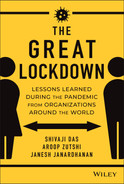CHAPTER 9
Hornet
By Christof Wittig (Founder and CEO)
About Hornet
Hornet is the world's top gay social network, with over 30 million users, providing a community home base that is available anytime, anywhere. Amplifying the radical, affirmative power of the LGBTQ+ community with cutting-edge technology, users feel comfortable sharing their experiences with friends who understand and validate their life. Hornet has become the number one gay app in markets such as France, Russia, Brazil, Turkey, and Taiwan, and is rapidly expanding its sizable user base in the US.
Backdrop: Social Networking for the Gay Community
The social networking industry is sometimes dubbed the oil industry of the 21st century, alluding to its increasingly pivotal role in managing interpersonal relationships, the formation of opinion in societies, and its ability to extract oligopolistic profits from their dominant position in the marketplace due to network effects.
However, the industry is undergoing constant change, and the market leaders are experiencing clear signs of disruption. Innovative social media formats such as mobile, chat, or ephemeral video challenged the status quo and prompted large acquisitions, such as those of Instagram and WhatsApp. Later, entire subcommunities left the one-size-fits-all networks and found their own spaces, starting with young millennials (Snapchat and TikTok), business users (LinkedIn), news (Twitter), or athletes (Strava). The arrival of TikTok and Clubhouse shows the ability of new entrants to routinely build very large audiences in short periods of time.
At their inception, gay apps were narrowly defined as dating apps, introduced and led to this day by Grindr. Hornet, which I cofounded in 2011, and other gay apps initially followed this lead and carved out niches in certain regions or subcommunities. Grindr continued to battle allegations of being much too dating- and sex-oriented, and toxic for minorities within the gay community, with initiatives like the now largely abandoned Kindr campaign.1 The need for a more community-oriented app became apparent.
Hornet recognized the opportunity to provide a more inclusive place for the LGBTQ+ community, as well as the market openings in social networking, and pivoted in 2016 to become the world's gay social network. By including content and influencer programs into the app, Hornet created a safe space for gay men to contribute, connect, and communicate over their interests rather than for dating purposes or in heteronormative and often unsafe environments.
In subsequent major releases, Hornet was first among gay apps to introduce a feed (Version 3 in 2016), to add news articles (V4 in 2017), to elevate the feed to be the app's home page rather than a grid of guys nearby (V5 in 2018), to add the Hornet Badge of authenticity (V6 in 2019), and most recently to add ephemeral video stories to the home page in fall 2020 (V7).
Today, with over 30 million diverse users, Hornet provides a community home base that is available anytime, anywhere. Amplifying the radical, affirmative power of the gay community with cutting-edge technology, users feel comfortable sharing their experiences with friends who understand and validate their life.
In 2020, prior to the effects of COVID-19, we expected to grow our paying users from 37,000 by 30% to close to 50,000, and our social networking users from around 450,000 daily active users (DAU) by 30% to over 600,000. We expected to increase engagement metrics, such as chat messages or feed activity, by 10% per user and revenue by 30%, turning a small profit after reinvesting additional revenue in additional hires. Hornet hadn't planned to spend any funds on marketing, just as we had not in 2019, and intended to grow purely organically.
First Signs: March 2020
Hornet's product and design team was meeting up for a “Design Sprint” during March 10–15, 2020, in Istanbul, Turkey, to test new product features with focus group users in my presence. (See Figure 9.1.) After that week, we were slated to travel to Cape Town, South Africa, to meet for the quarterly product and engineering offsite as well as the annual executive offsite.

FIGURE 9.1 The “Design Sprint” in Istanbul, March 2020.
The news reports were already tense in February and early March, with COVID-19 cases skyrocketing in various parts of the world and Italy going into full lockdown on March 9. The situation rapidly deteriorated further during the week of March 10, while we gathered in Istanbul, and we started to see a heavy impact on our business:
- Daily active users (DAU) dropped 2% that week and continued to drop 2–3% every week until it hit a trough on April 24.
- Nearly all premium brand partners of Hornet (e.g., Gilead, Panasonic, LiveNation) put their advertising campaigns on hold by the end of March.
- User subscription revenue softened only slightly and was supported by renewals and a generally strong performance earlier in the year. However, since Hornet makes a significant portion of its user revenue in various emerging markets, the drop of the Russian ruble, Turkish lira, and other currencies by some 20% from March 2020 onwards was also immediately hitting the revenue top line, denominated in US dollars.
- On March 13, a senior key engineer based in Prague, slated to travel to the offsite in Cape Town, fell ill to COVID-19.
All of us who had traveled to Istanbul and were scheduled to travel to Cape Town on March 16 decided to cancel our trips and return to our respective hometowns.
Based on the initial read of numbers and the general news, the executives anticipated a steep drop in revenue. We convened on Zoom (a platform the widely distributed company used since 2015) in an extraordinary board meeting on April 2 to review Hornet's economic assessment (see Figure 9.2) and to hammer out the details of a COVID Preparedness Plan (Plan CP). We decided on a raft of measures to weather the crisis, including:
- Acceleration of community digitization to make Hornet a COVID-19 winner
- Cost reductions by going fully virtual across the entire company, without offices or travel, and other cost-saving measures
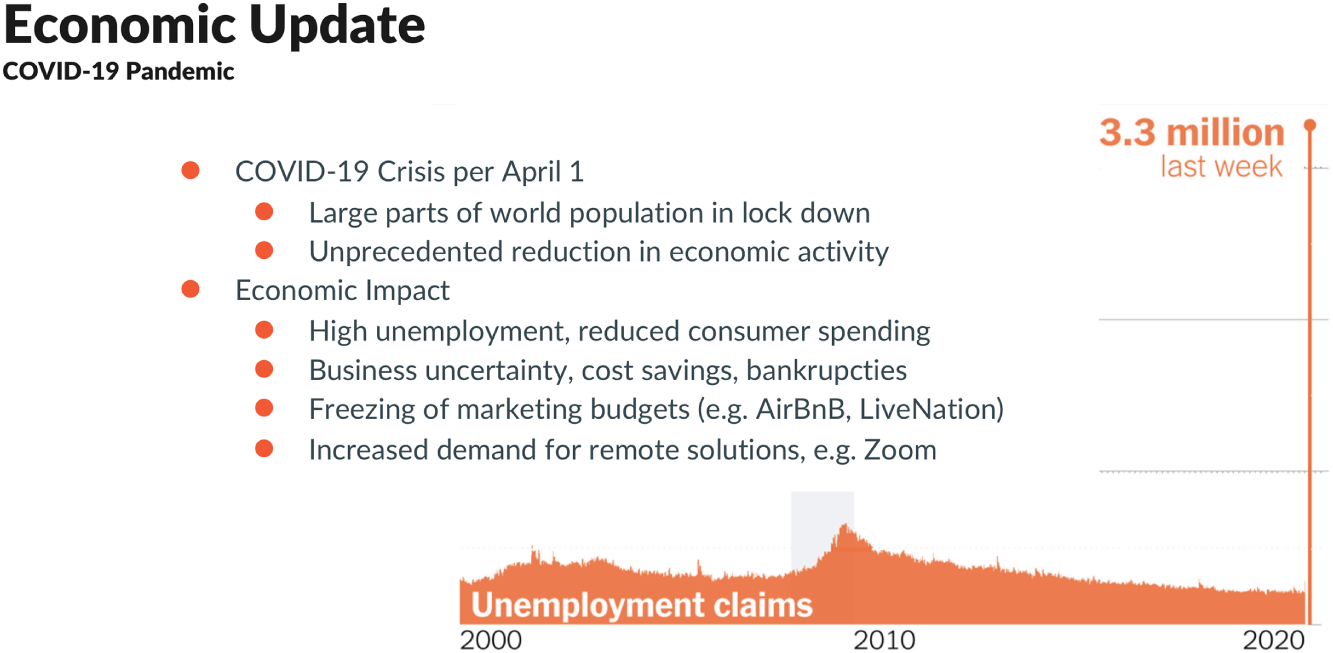
FIGURE 9.2 Hornet's economic assessment from the beginning of the pandemic.
Source: Hornet
- Converting 20% of the entire team compensation for two quarters to equity and future bonuses, which was unanimously and gratefully accepted by all team members, as they valued the promised job security
- Raising 1.5x monthly revenue in a Working Capital Note to fortify our balance sheet
- Appointing a COVID czar to calibrate the tone of Hornet for the hardships ahead, reprogramming most of our campaigns toward staying at home, wearing masks, and other socially responsible behavior
During the Great Lockdown of 2020–21
There were many implications for both our business and our industry in 2020–21.
Social Networking Usage
Generally, social networking usage was only slightly disrupted by COVID-19. Facebook's DAU barely dipped in 2020 in the US, Canada, and Europe and grew moderately throughout the year in the rest of the world, not very different from the trends observed in 2019. Facebook family's (including Instagram and WhatsApp) DAU grew stronger, also in line with the 2019 trends.2 Newcomer TikTok grew strong from 500 to 700 million monthly active users (MAU) in the first half of 2020,3 and strong new players (Clubhouse) emerged as in prior years: Clubhouse started in April 2020 and went from a few thousand users in May 2020 to three million as of January 2021.4 However, since social networking markets in general were already pretty saturated, COVID-19 didn't steeply accelerate their growth rates as it did for video calling (Zoom) or online food delivery.
Social Networking Advertising Revenue
Initially, when COVID-19 hit, advertising revenue plunged in Q2 and Q3 2020. In Q4 2020, this trend reversed, as businesses started to adapt to the increased digitization of economies and acceleration of direct-to-consumer models, while offline retail locations still remained partially or fully shut. This benefited digital, highly targeted, direct-to-consumer advertising revenue. For instance, at Facebook, the seasonally strong Q4/2020 saw a 43% increase over Q1/2020, while the respective spread in 2019 was only 30%.
Dating Users
Dating apps took a deeper drop in Q2 2020 than social networks but also rebounded strongly in Q4, as users looked to reconnect or find new friends or partners online.
Hornet's User Numbers
Our user numbers initially dropped moderately by 5% in 2020 but then fully recovered in line with the industry. (See Figure 9.3.)
However, Hornet's composition of users – social networking versus dating users – changed dramatically in 2020 as we continued to ship social networking functionality. Social users on Hornet rose from around 450,000 average daily active users at the beginning of 2020 by 30% to over 600,000 by the end of 2020. (See Figure 9.4.)

FIGURE 9.3 Hornet's user numbers.
Source: Hornet
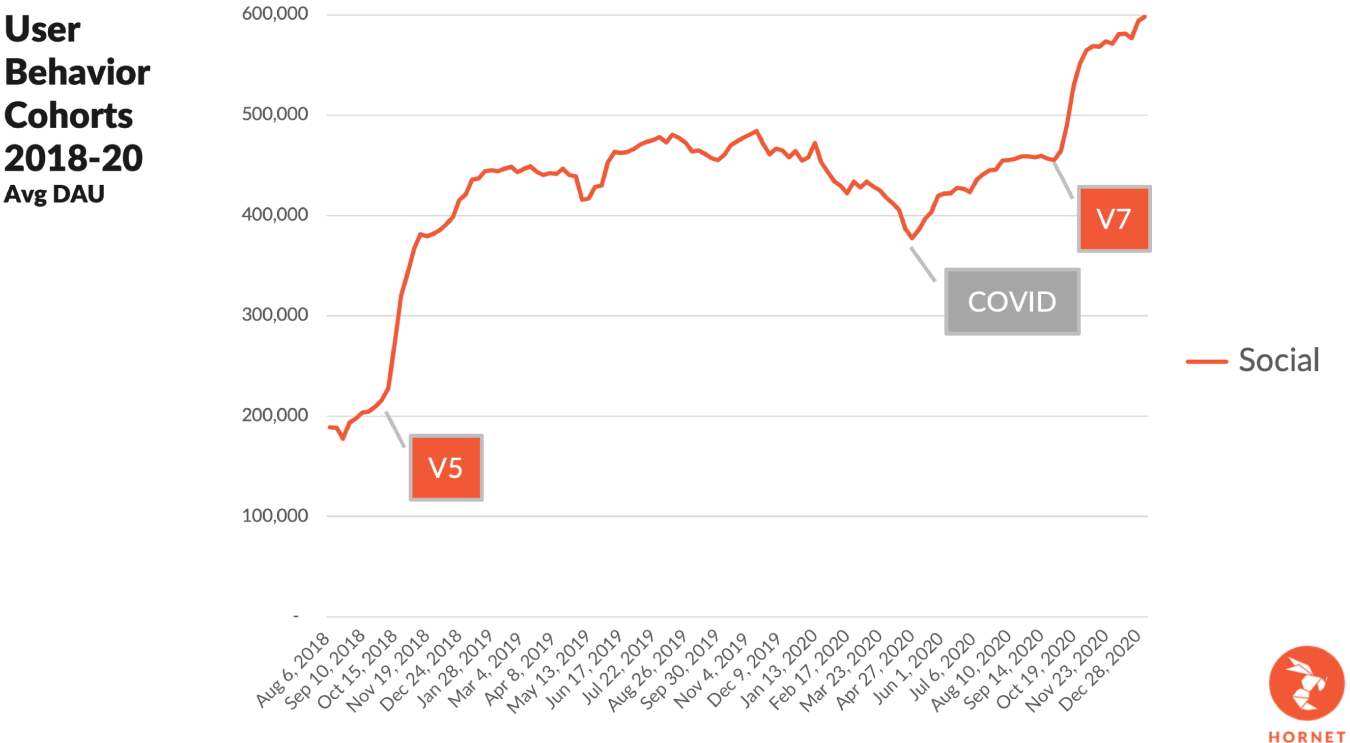
FIGURE 9.4 The evolution of Hornet's user composition.
Source: Hornet
Social usage would be a feed-based activity, where people, independent of location, would engage on posts or post their own content, together with many other users in a public space, organized around common interests pertaining to the LGBTQ+ community.
Engagement on Hornet exploded. The average number of chat messages sent per user per day jumped from 24 to over 30 at the peak of COVID-19 and has now solidly settled at 28, some 20% higher than in 2018.
Video stories, launched in Version 7 in October 2020, became an instant hit. (See Figure 9.5.) By the end of April 2021, some 25,000 user-generated videos were posted every week, triggering some 1 million users to watch them a total of over 250 million times.
In short, from a user metric perspective, Hornet achieved all its ambitious goals to grow as a gay social network in 2020, despite COVID-19.
Hornet's Revenue and Costs
Hornet's revenue developed K-shaped in 2020. Advertising took a beating while user revenue continued to grow strong.
Advertising revenue plunged sharply, as it did for peers in the industry, and has not rebounded, partially because of increased barriers for smaller advertisers to earn revenue through marketplace headwinds (such as GDPR and IFDA). The premium direct business barely had a heartbeat in Q2, but in Q4 2020, it came back with one of the strongest quarters of new insertion orders (mostly for 2021 flights) since 2018.
Subscription revenue from users, on the other side, barely budged in Q2/2020 but continued to increase rapidly thereafter, continuing its trend of fast-rising user revenues stemming from Hornet's now well-differentiated position as a social network. (See Figure 9.6.)
From January 2020 to January 2021, the number of paying users at Hornet rose by 45%. On the revenue side, though, in subscription prices denominated in emerging market currencies such as the Russian ruble or the Turkish lira – which plunged some 20% versus the US dollar in Q2/2020 – the dent was bigger and has not yet fully recovered because many of these currencies remain below their dollar value compared to a year prior. (See Figure 9.7.)

FIGURE 9.5 User video views.
Source: Hornet
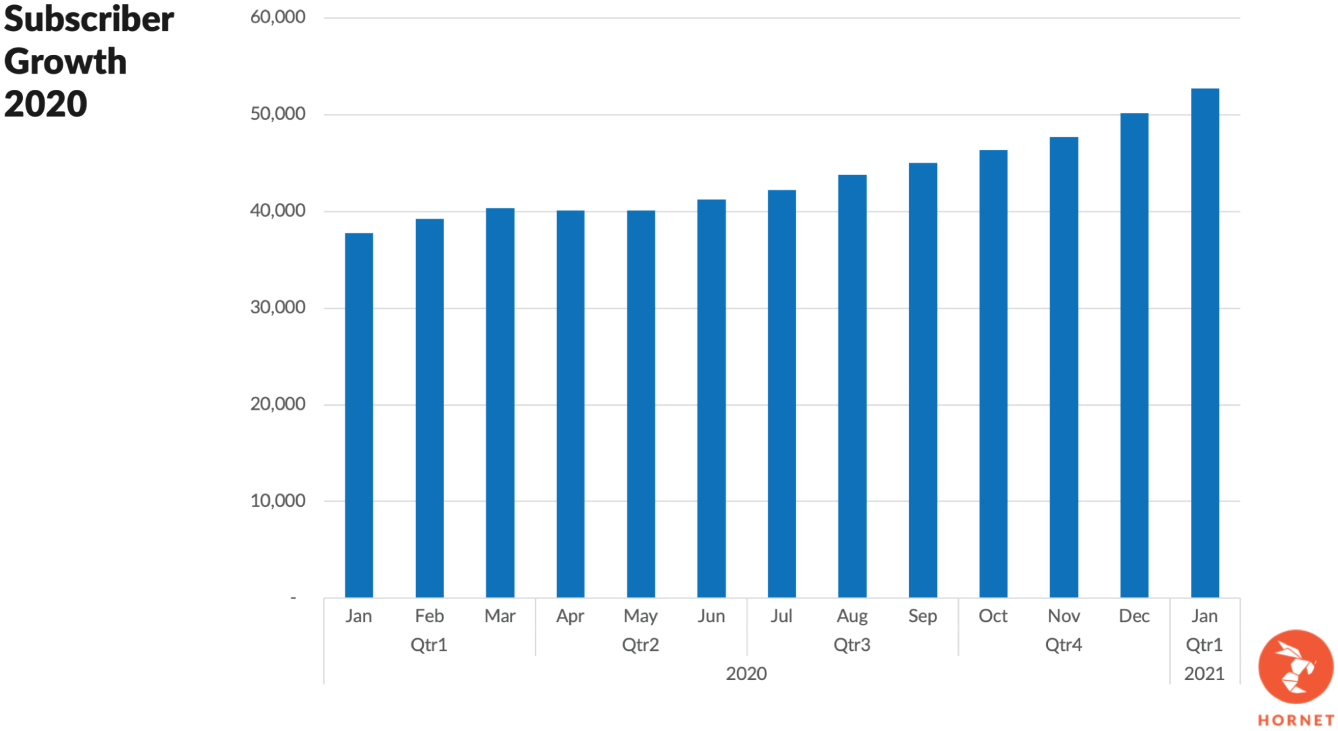
FIGURE 9.6 Subscriber growth in 2020.
Source: Hornet
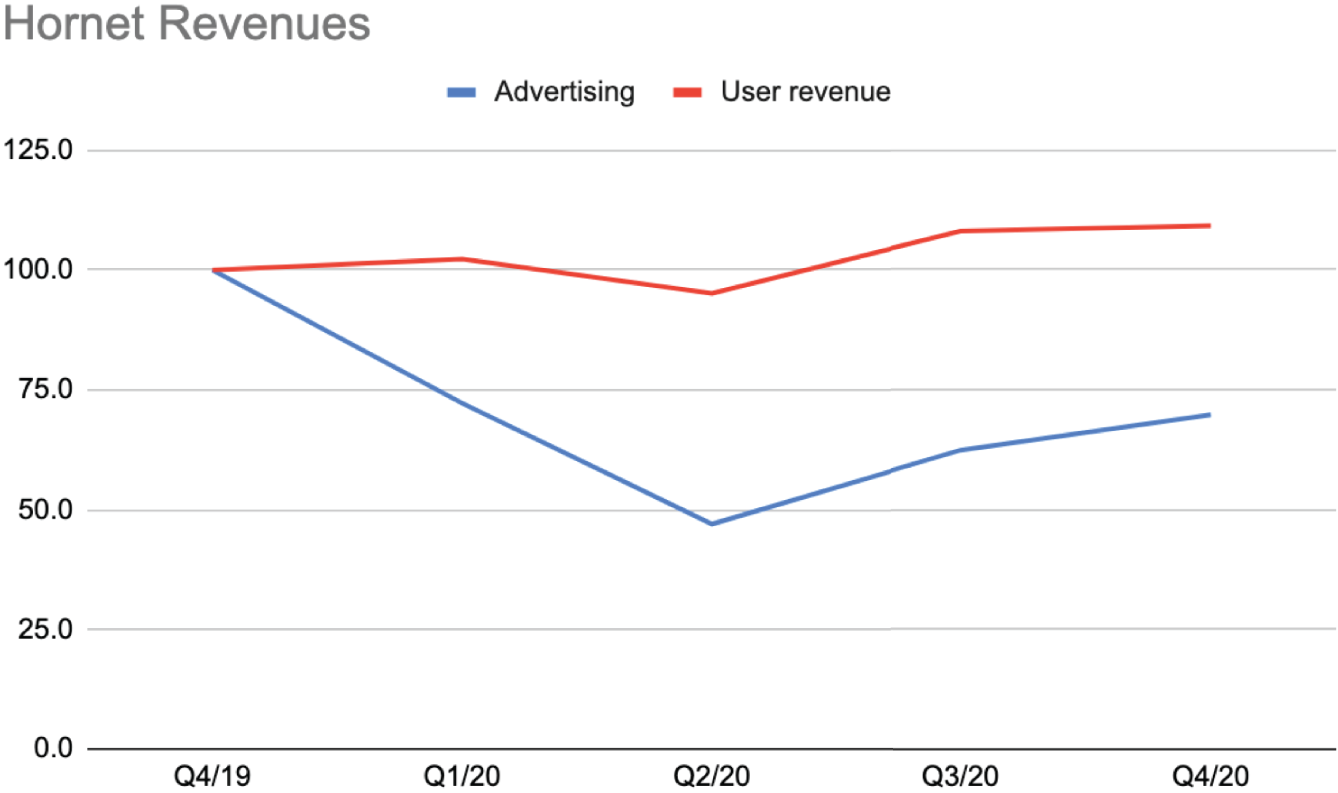
FIGURE 9.7 Company revenues in 2020.
Source: Hornet
Hornet costs adjusted in Q2/2020 through variable cost of goods sold (COGS: app store revenue share, server cost, advertising sales commissions) and the cost savings realized through Plan CP. By working fully remotely, we saved nearly 50% of our SGA (Selling, General & Administrative expenses – especially office leases and travel). (See Figure 9.8.) Since Hornet has always operated largely remotely, adopting Zoom many years prior for video conferencing, we barely missed a beat when switching to 100% virtual work from home.
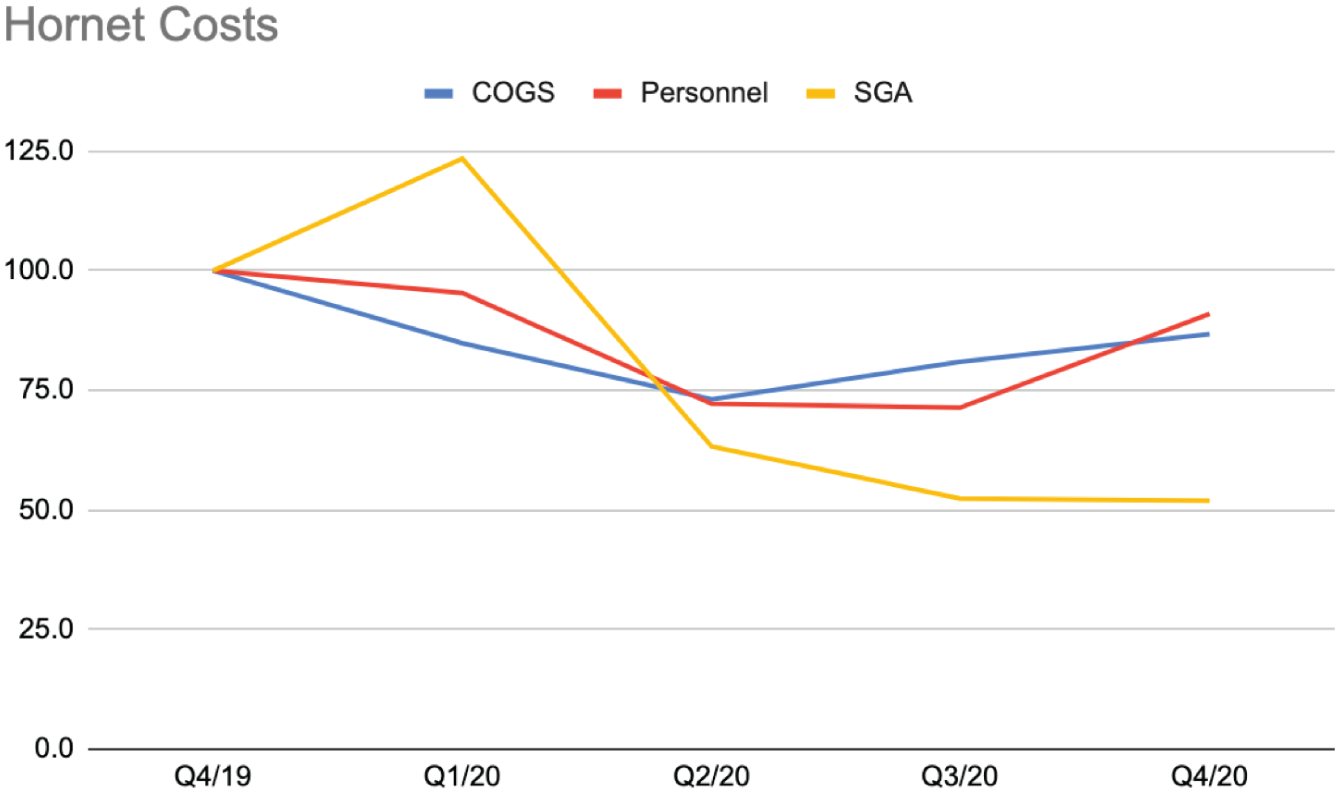
FIGURE 9.8 Company costs in 2020.
Source: Hornet
In the end, we managed to eke out a profit in 2020 despite massive headwinds to our top line, thanks to our strong sense of mission and community within the team and our already distributed workforce.
Navigating the Great Lockdown
Hornet engaged on several fronts to successfully navigate the Great Lockdown.
What the Organization Did for Liquidity
Through a combination of cost reductions, compensation deferrals, and strong user subscription revenues, despite foreign exchange rate headwinds, we were able to turn a profit in Q3/2020 and contribute a neutral cash flow from operation by Q4 again. In addition, we raised a Working Capital Note, offering attractive interest rates in a generally low-rate environment, so that the cash ending on December 31, 2020, was overall 65% higher than at the end of 2019.
What the Organization Did with People
We at Hornet felt that COVID-19 was a chance to accelerate the adoption of gay social networking while offline resources were unavailable: gay bars were closed, travel disrupted, and pride parades canceled. This resulted in two major outcomes with respect to our users and our team:
- There was no idling our team but rather a need to accelerate product rollout to add missing social networking features such as ephemeral video stories as soon as possible. We decided to move full steam ahead, retain all team members, and even add senior engineers. To manage cost, we asked for a 20% haircut on everyone's compensation (executive team 25%, CEO 50%) in exchange for stock options and future bonuses. Since there was great alignment around the mission and the need to pull together during these times as a company, every member joined the voluntary pay deferral for the proposed six months.
- There was an opportunity to educate our users about the need to connect to their community, anytime and anywhere, especially during the Great Lockdown. Hornet appointed a COVID czar with a background in infectious diseases and mental health issues pertaining to the LGBTQ+ community, who would calibrate all messaging to frame COVID-19 as an example of why the community and the digital access to it mattered more than ever before. Campaigns like the #GreatGayStayIn allowed people to connect socially from their homes while staying physically distanced to protect other members of our communities from infections. (See Figure 9.9.)
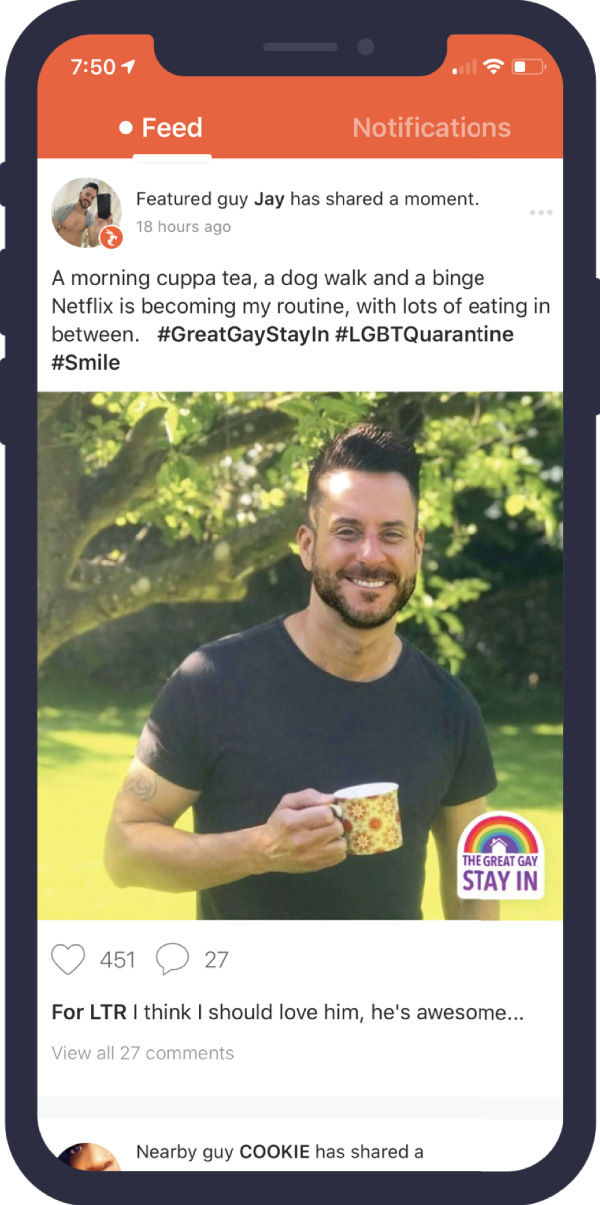
FIGURE 9.9 Social media campaigns helped people connect while remaining physically distanced.
What the Organization Did with Investment Plans
Since Hornet felt COVID-19 would be a big catalyst to move the gay community to more digital connections, we decided to accelerate the investment to add missing social networking capabilities, such as ephemeral video short stories. We planned to launch Version 7 with such capabilities at the end of the six-months-long COVID preparedness period, and so it did on October 7.5 (See Figure 9.10.)
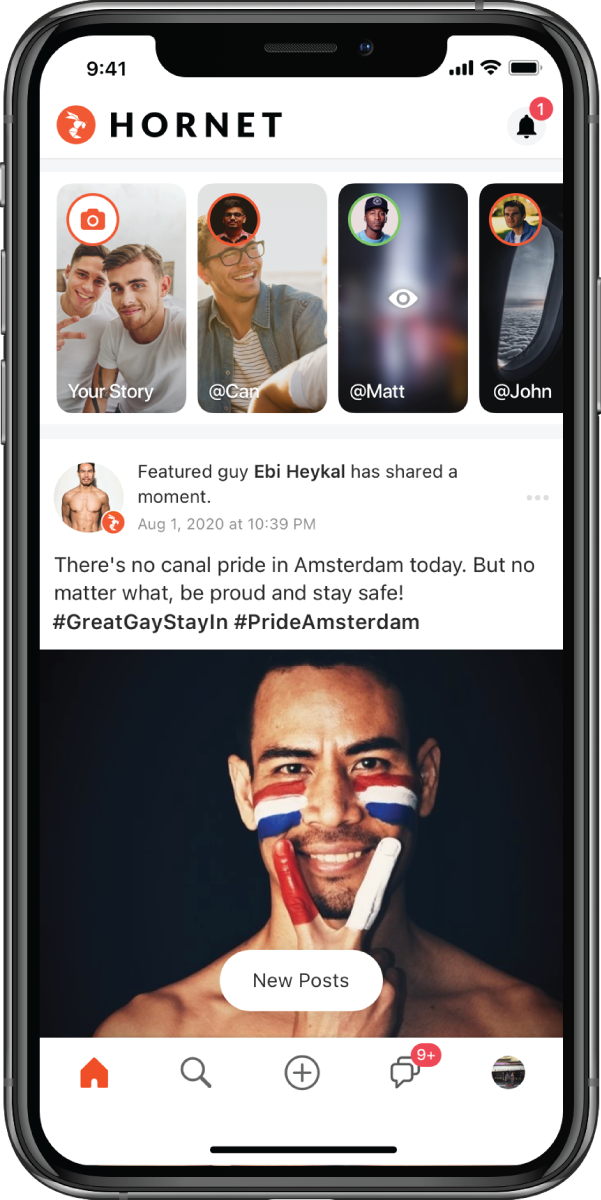
FIGURE 9.10 The pandemic served as a catalyst for more digital connections.
At the same time, we reduced our exposure to advertising revenue and continued to explore new avenues to user revenue by introducing the virtual in-app currency Hornet Honey, also a long-sought project that was accelerated as part of COVID-19.6
What Happened Across Regional Markets
The shifts and swings were wider in markets that managed COVID-19 relatively poorly, such as the United States and Brazil, and were much less pronounced in countries that emerged faster or remained less affected due to their specific geographies, such as Russia or Taiwan. We observed that the announcements of lockdowns made users wary for a few days or weeks, before adjusting their habits and embracing social media to stay in touch with others. As of March 2021, the countries with the biggest volatility were those that were deep in a new wave, especially Brazil and France. Taiwan, on the other end of the spectrum, with just above 1,000 cases and only 10 deaths, barely registered any changes to the longer-term trajectories.
Future Outlook
We believe social networking will not only remain a backbone to our societies but, thanks to the experiences and proliferation of new technology as well as new habits formed under COVID-19, will continue to benefit from a COVID-19 accelerated digitization of many aspects of our lives, including working from home, online shopping and food delivery, homeschooling, and digital entertainment, from Netflix to live-streamed concerts.
We also believe that the increased fragmentation of social networks by user interests or communities will continue and that we at Hornet are perfectly positioned to take full advantage of these changes as they pertain to the LGBTQ+ community.
At the opening of 2021, we have fully recovered with our user-generated B2C revenues to pre-COVID-19 levels and have reduced advertising revenue as part of our revenue mix, making us less dependent on the whims of B2B markets.
We believe that Hornet's social networking proposition will take hold in more and more markets and will eventually disrupt the way gay apps are seen anywhere in the world, allowing us to grow our global user base by 10 times, once reaching certain tipping point thresholds, as the company has already successfully done in over a dozen markets.
Learnings from the Great Lockdown
The Great Lockdown felt like a massive catalyst for the digitization of society. Innumerable societal activities were jolted into the digital space, and the need to connect to one's community for personal connections made no exception. It is difficult to list all the benefits, as they will be widespread and very individual, such as the ability to move into a larger home in a less expensive city due to working from home, but also the ability to find support in one's community, like the LGBTQ+ community, no matter where in the world you live or what access to such resources are available locally.
No doubt, lots of brick-and-mortar businesses and many analog LGBTQ+ resources will be permanently disrupted or fail due to that change, such as iconic gay bars in San Francisco or canceled sports, arts, and cultural events, but the upside is increased reach, efficiency, and societal learning and etiquette of how to best leverage digital tools for interpersonal connections.
Hornet as a digital solution to connect parts of our societies has been and will be a big beneficiary of these changes, and the company is even more confident than before that it was on the right track investing into tools for meaningful connections formed through social media, rather than often relying on proximity and in-person meetups.
While I cannot say whether these developments are good or bad per se, they were bound to happen anyway. For those who were privileged enough to do so, COVID-19 has created a more level playing field to transition more of their lives to the digital realm.
At Hornet, a digital disrupter, we see COVID-19 as a massive catalyst to drive positive change for our business for years to come.
About the Contributor

Christof Wittig is a serial software entrepreneur and investor. He is founder and CEO at Hornet and managing partner at Strive Capital. Christof also serves as director of fundraising for the Gay Games 11 in Hong Kong in 2022. Christof has been an investor and/or board member in various companies, including Enish (TYO:3667), Metago, KeepSafe, VirtaHealth, Black Medicine, Moviepilot, Boxfish, Cerebral, and App Annie. Christof holds a master of science in management from Stanford University's Graduate School of Business, where he was a Sloan Fellow in the class of 2004 and author of the case studies on MySQL and Google's Android. He also holds a Dipl.Ing. from Technical University Munich.
Notes
- 1 #KindrGrindr: Gay dating app launches anti-racism campaign, https://www.bbc.com/news/newsbeat-45573611
- 2 Facebook Q4 2020 earnings, https://investor.fb.com/investor-events/event-details/2021/Facebook-Q4-2020-Earnings-/default.aspx
- 3 https://www.cnbc.com/2020/08/24/tiktok-reveals-us-global-user-growth-numbers-for-first-time.html
- 4 https://www.businessofapps.com/data/clubhouse-statistics/
- 5 Hornet Version 7 Launch announcement, https://hornet.com/about/v7-video-stories/
- 6 Hornet launches Honey as in-app currency, https://hornet.com/about/award-posts-honey/
